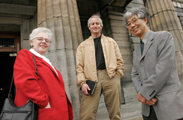Education special
Popular profs

Professors Ann Wechsler, Thomas LaMarre and Yuzo Ota
Owen Egan
Good teaching comes in many forms. Great professors are found in every discipline, and all ages and personality types are included within their number. Upon talking to some of the McGill teachers who were hailed by a campus survey by MacLean's magazine as "Popular Profs", it is clear that there are many ways to be a model pedagogue.
Professor Yuzo Ota of the History Department is a self-described "odd bird", who was forced to make an enormous transition upon arriving at McGill from the University of Tokyo in 1974. The educational model he encountered was dramatically different from the one he knew in Japan, and the adjustment was all the harder given that Ota was (and is) a "very shy person". Success as a teacher has, ultimately, come not through transforming himself, but by being who he is.
"I teach in a way very different from other professors," says Ota. "Perhaps I just had to be myself without making any real effort to adopt a North American teaching style. Perhaps some students like various styles."
Ota is not the only professor at McGill who has had to learn to overcome shyness. Ann Wechsler of the Physiology Department is another who made the Macleans list. Like Ota, she considers herself bashful. Wechsler ("Dr. Mom" to many of her students) found the role of teaching brought out an unexpected side of her personality.
"I came to discover I'm a bit of a ham to some extent. Once I'm in front of the class, I'm a different person. Teaching is a lot of preparation, a lot of organization, but when that's been done, a lot of it is performance."
Over her forty years at McGill, Wechsler has learned to generate student enthusiasm while teaching an empirical subject to large classes. She recognizes that "the facts are in the books" and, as such, context is key. The two most important elements that punctuate her teaching, according to Wechsler, are the historical evolution of science, as well as its practical implications.
"The most important thing we can do is to provide a perspective on what we teach. You want to share that excitement for your subject, to present your understanding of its importance."
The challenge of enlivening a fact-based discipline in front of a large class is also familiar to Paul Wiseman, another 'Popular Prof' who teaches jointly in the Chemistry and Physics Departments. For inspiration in teaching, Wiseman has drawn upon his own educational experience in a small college where professors typically knew all their students by name. Undaunted by his first-year chemistry courses containing several hundred students, he decided that he would create a classroom conversation.
"How does one deal with teaching on this scale? For one thing, I said 'I'm taking questions'. To establish an interactive dialogue has led to a far more intimate setting. It made [Leacock] 132 seem a lot smaller, and it's a lot more fun for me."
Like Wechsler, Wiseman has also kept his lectures lively by humanizing science, often by presenting material through the perspective of the scientists who first encountered it. And he has integrated technology with his teaching, attempting to build on the pioneering web work of his colleague, David Harpp, who posts his classroom lectures on-line.
Another who credits his colleagues for teaching inspiration is Thomas LaMarre of East Asian Studies. He attributes his success in the classroom to his program, and explains that he and the other professors with whom he works have created an environment that is based around students.
"If you really want to communicate, and make an effort to do it, students respond positively," says LaMarre. "My understanding's always been that an undergrad student can learn or read anything. It's important not to be patronizing."
In reflecting on good teaching, he also emphasized that an excitement for what one is doing is an integral part of classroom success. Like the others, he cited a passion for one's subject as a key component of being an effective teacher.
These four professors also share one other value when it comes to teaching: humility. Though none of them referred to it explicitly, they all showed a sense of patience and self-effacement that has no doubt helped to make a good impression on their students.
